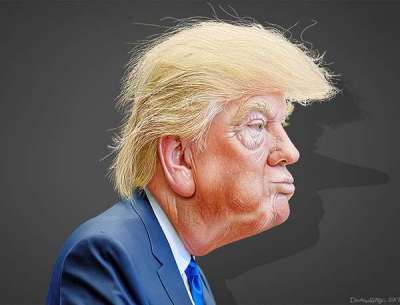Should Trump find himself unable to run for office, might he feel he owes the red states that supported him, and even America?
Before he got lost in a maze of language (c. 1900), Henry James said in The Europeans (1878) with utter simplicity, “It takes a great deal of history to make a little literature.”

Having just renewed my poetic license, even as I became an ex-poet many decades ago (there is, after all, no “prose license”), I think I can tweak James’ declaration to offer The Former some advice about reeducating himself so that he will be a more enlightened candidate for Head of the Board of Education in Palm Beach County. No Maoist methods — just a Liberal Education unlike the one he didn’t have at Wharton.
He may be pleased to have such a position after possibly being shunned even at The Breakers’ charity balls, not dignified enough even to be a “walker,” a humiliation as rebarbative as Alan Dershowitz’s admitted exclusion (“black-balled,” his term) from a book festival on Martha’s Vineyard.
I suggest: “It takes at least a minimal understanding of our Constitutional history to qualify someone as a candidate for President.” To meet this standard, such a candidate should have for starters a stack of 3×5 cards quotes about the foundational plinths of our democracy. A Webster’s dictionary and thesaurus would be useful as well for any person who has more boxes at hand than words.
This stack would be the equivalent of having access to a Book of Quotations, a verbal bowl of Reaganesque jellybeans, that any president could consult before becoming enraged by a deviation from his Orwellian distortions of language.
This candidate would be tested about an adequate comprehension of our country’s essential documents by the winner of the National High School Spelling Bee Championship before such a person would be allowed to run for high office.
I say this on the assumption Mr. Trump will be disqualified for elective office for violations of Article 3, 14th Amendment (“engaged in insurrection”), but still might want to make a positive contribution to life in America after he has immersed himself for the first time in its history as preserved in our best national literature.
Unable to run for elective office, he still may wish after recovering from a nervous breakdown, if he is 3-dimensional enough to have one, to make a contribution to the future of the Republic and the flag “for which it stands” (not trampled on).
Many useful books of quotation are readily available. I’d be happy to loan Mr. Trump my copies, but I’m sure he can find a PAC to pay for his. As a mega-tweeter, Mr. Trump will be pleased by the brevity, but power, of these quotations (“I love power, let me give it to you, baby!”). Here are a few examples:
“No generalization is wholly true – not even this one” (Oliver Wendell Holmes, Jr.).
“Self-love is the greatest of all flatterers” (Duc de la Rochefoucauld).
“Power is the great aphrodisiac” (Henry Kissinger).
“There is one way in this country in which all people are created equal…that institution, gentlemen, is a court.” (Harper Lee, To Kill a Mockingbird). In the event Mr. Trump is overwhelmed by the burden of sustained thought as evoked by these verbal tidbits and would prefer to get lost in elusive abstractions (one of his trompisms –ouch!), he might ponder the meaning of some cryptic claims that explore the value of emptiness and nothingness: Sartre’s Being and Nothingness, Roland Barthes’ Writing Degree Zero.
Just deciphering the opening pages of either Parisian tome would take him so long that we wouldn’t have to worry about his name appearing on any ballot for many years.
I see him lying on a sturdy hammock or elevated hummock in the fading Florida sunlight. He is humming “red states in the sunset” without a thought in the world other than his own, content as last, a luminist portrait of a benighted homo erectus.
Howard R. Wolf treasures his copy of Sheridan Baker’s The Practical Stylist. Prof. Baker was his mentor at the University of Michigan where Howard earned his doctorate in literature with a thesis on “Forms of Abandonment in the Fiction of Henry James.”
- Red States in the Sunset - August 10, 2023
- A Robin Hood Rerun - July 26, 2023
- Space Exploration: In Dreams Begin Responsibilities - July 3, 2023

